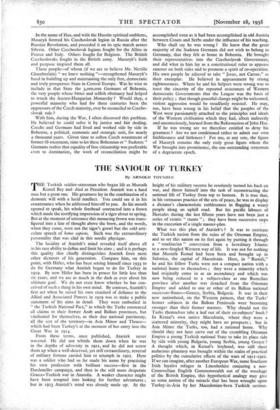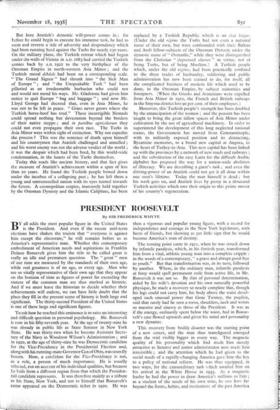THE SAVIOUR OF TURKEY
By . ARNOLD TOYNBEE
The lucidity of Atatiirk's mind revealed itself above all in his rare ability to define and limit his aims ; and it is perhaps this quality that chiefly distinguishes Atatiirk from most other dictators of his generation. Compare him, on this point, with Hitler, who has been setting himself since 1933 to do for Germany what Atatiirk began to do for Turkey in 1919. By now Hitler has been in power for little less than six years, and we are as much in the dark as ever about his ultimate goal. We do not even know whether he has con- ceived of such a thing in his own mind. By contrast, Atatiirk's first act when he raised his own standard of defiance to the Allied and Associated Powers in 1919 was to make a public statement of his aims in detail. They were embodied in " the Turkish National Pact," in which the Turks renounced all claims to their former Arab and Balkan provinces, but vindicated for themselves, as their due national patrimony, all the rest of •the territory—in Asia Minor and Thrace— which had been Turkey's at the moment of her entry into the Great War in 1914.
From these terms, once published, Atatiirk never wavered. He did not whittle them down when he was in the depths of adversity in 192x, and he did not screw them up when a well-deserved, yet still extraordinary, reversal of military fortune carried him to triumph in 1922. Here was a soldier who had so far made his name by practising his own prOfession with brilliant success—first in the Dardanelles campaign, and then in the still more desperate Graeco-Turkish war in Anatolia. A weaker character might have been tempted into looking for further adventures ; but in 1923 Atatiirk's mind was already made up. At the height of his military success he resolutely turned his back on war, and threw himself into the task of reconstructing the national life of Turkey from top to bottom. It is true that, in his strenuous practice of the arts of peace, he was to display a dictator's characteristic ruthlessness in flogging a weary people along an uphill road. But his pacific labours of Hercules during the last fifteen years have not been just a series of erratic " stunts " ; they have been successive steps in the execution of a single master-plan.
What was this plan of Atatiirk's ? It was to extricate the Turkish nation from the ruins of the Ottoman Empire, and to set this nation on its feet again by putting it through a " totalitarian " conversion from a hereditary Islamic to a new-fangled Western way of life. It was not for nothing that Mustafa Kemal had been born and brought up in Salonica, the capital of Macedonia. Here, in " Rumili," he and his fellow Turks were not a compact nation with a national home to themselves ; they were a minority which had originally come in as an ascendancy and which was now being reduced to a subject-class as one. Rumelian province after another was detached from the Ottoman Empire and added to one or other of its Balkan national successor-States—Greece, Serbia, Bulgaria. It was in their new nationhood, on the Western pattern, that the Turks' former subjects in the Balkan Peninsula were becoming stronger than their former masters. Why should not the Turks themselves take a leaf out of their ex-subjects' book ? In Kemal's own native Macedonia, where they were a scattered minority, they might have no prospects ; but in Asia Minor the Turks, too, had a national home. Why should they not here carve out of the crumbling Ottoman Empire a young Turkish national State to take its place side by side with young Bulgaria, young Serbia, young Greece ? A thought which, in Kemal's boyhood, was still sheer audacious phantasy was brought within the realm of practical politics by the cumulative effects of the wars of 1911-1922. If we can imagine, after another European War, some Southern Irish loyalist refugee in Lincolnshire conjuring a neo- Cromwellian English Commonwealth out of the wreckage of the British Empire, this hypothetical analogy may give us some notion of the miracle that has been wrought upon Turkey-in-Asia by her Macedonian-born Turkish . saviour. But here Atatiirlc's demonic will-power comes in ; for before he could begin to execute his immense task, he had to stem and reverse a tide of adversity and despondency which had been running hard against the Turks for nearly 25o years. On the military plane, the Turkish retreat which had begun under the walls of Vienna in A.D. 1683 had carried the Turkish armies back by A.D. 1920 to the very birthplace of the Ottoman Empire in north-western Asia Minor ; and the Turkish moral dadde had been on a corresponding scale. " The Grand Signor " had shrunk into " the Sick Man of Europe " ; and " the Unspeakable Turk " had been pilloried as an irredeemable barbarian who could not and would not mend his ways. Mr. Gladstone had given him notice to quit Europe " bag and baggage " ; and now Mr. Lloyd George had decreed that, even in Asia Minor, he was not to be left in peace. " Grass never grows where the Turkish horse-hoof has trod." These incorrigible Nomads could spread nothing but devastation beyond the borders of their native steppe ; and in partibus agricolarum they could not even propagate their own race. The Turks in Asia Minor were within sight of extinction. Why not expedite the process ? This was the sentence of death upon himself and his countrymen that Atatiirk challenged and annulled ; and his worst enemy was not the adverse verdict of the world ; it was the despair which had been bred, by this world-wide condemnation, in the hearts of the Turks themselves.
Today this reads like ancient history, and that fact gives the measure of Atatiirk's achievement within a span of less than 20 years. He found the Turkish people bowed down under the incubus of a collapsing past ; he has left them a young and untrammelled nation with its eyes turned towards the future. A cosmopolitan empire, insecurely held together by the Ottoman Dynasty and the Islamic Caliphate, has been replaced by a Turkish Republic which is an etat laique. (Under the old regime the Turks had not even a national name of their own, but were confounded with their Balkan and Arab fellow-subjects of the Ottoman Dynasty under the dynastic name of " Osmanlis," while they were distinguished from the Christian " depressed classes " in virtue, not of being Turks, but of being Muslims.) A Turkish people which, under the old regime, had been practically confined to the three trades of husbandry, soldiering and public administration has now been trained to do, for itself, all the complicated business of modern life which used to be done, in the Ottoman Empire, by subject minorities and foreigners. (When the Greeks and Armenians were expelled from' Asia Minor in 1922, the French and British railways in the Smyrna district lost 90 per cent. of their employees.) Moreover, this Turkish people's strength has been doubled by the emancipation of the women ; and the peasant has been taught to bring the great fallow spaces of Asia Minor under cultivation by the use of agricultural machinery. In order to superintend the development of this long neglected national estate, the Government has moved from Constantinople, with its militarily exposed position and its distracting, Byzantine memories, to a brand new capital at Angora, in the heart of Turkey-in-Asia. This new capital has been linked up with the provinces by a network of new roads and railways ; and the substitution of the easy Latin for the difficult Arabic alphabet has prepared the way for a nation-wide abolition of illiteracy. We are describing a giant's task ; and even the driving-power of an Atatiirk could not get it all done within one man's lifetime. Today the man himself is dead ; but his work goes on, and Atatiirk lives by proxy in a thousand Turkish activities which owe their origin to this prime mover of his country's regeneration.

























































 Previous page
Previous page